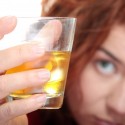Doctors sound alert over binge drinking from age eight
Children as young as eight are being brought into hospitals unconscious after getting drunk on cheap cider, spirits and alcopops such is the ease of access to cut-price alcohol, according to doctors.
The problems of binge-drinking are now so serious that small hospitals that used to treat one intoxicated child a month are now receiving several under-age drinkers every Friday and Saturday night, the British Medical Association’s annual conference was told.
The warnings from doctors were backed today by figures suggesting that a child under 12 is being admitted to Accident & Emergency departments because of alcohol every other day. Of the more than 4,500 hospital admissions of children under the age of 16 caused by alcohol last year, 181 involved under-12s.
Reporting that drink-related problems had become “much, much greater” over the past decade, doctors called for a minimum price per unit of alcohol, clearer labelling of alcoholic content and a ban on the advertising of beers, wines and spirits.
Keith Brent, a paediatrician from Bournemouth, said that the Government’s refusal to take strong action on the most pressing of public health issues was symptomatic of an administration that “bowed down to big business”.
“The intoxicated children I see are not being brought in because they are getting drunk in pubs and bars,” Dr Brent said. “They are being found unconscious in the park and on the beach. They have £20 in their pocket and their aim is to get as drunk as possible. If you put a minimum price on a unit of alcohol, then at least you can begin to limit the amount of alcohol that can be bought.
“But what the Government is doing is what it’s done in the past with public health measures. It’s pushing it into the long grass. The things we are suggesting aren’t going to be solve all problems at a stroke, but they are likely to be helpful and anything that’s helpful should be tried.”
Dr Brent said that he used to see cases of children intoxicated by alcohol “very occasionally”, but now saw children every weekend. “It is very sad. I now have to start my ward rounds by working out how many intoxicated youngsters we’ve got in.”
The latest A&E figures, obtained by the Liberal Democrats, reveal that there have been 1,426 admissions for children under 12 due to alcohol since 2002. Last year there were 4,441 emergency hospital admissions of young people aged 12 to 15 and 7,766 admissions of 16 and 17-year olds due to alcohol — rises on 2002 figures of 12 per cent and 66 per cent respectively.
Norman Lamb, the Liberal Democrat health spokesman, said the figures were “shocking new evidence of the scale of the alcohol crisis facing this country”.
“The Government cannot continue to ignore the fact that thousands of children are drinking so much that they end up in A&E,” he said.
“Unless we invest in treatment services, put an end to alcohol being sold at pocket-money prices and start educating our children then these figures are only set to get worse.”
Last year the Department of Health commissioned the School of Health and Related Research (ScHARR) from the University of Sheffield to carry out an independent review of the evidence on the effects of the pricing and promotion of alcohol. It concluded that pricing and availability were the two greatest levers to controlling consumption.
In March Sir Liam Donaldson, the Chief Medical Officer for England, warned that easy access to cheap alcohol was “killing us as never before” and must be curbed with tough licensing laws and a minimum price of 50p per unit of alcohol. But the Prime Minister, who issued a rebuttal to Sir Liam’s report in advance of its publication, said that he did not want to impose additional burdens on the majority, who were “moderate” drinkers.
Proposing the BMA motion to control the nation’s drinking habits, Chandra Mohan, from London, said yesterday that the Government had to stop making excuses for inaction and follow moves in Scotland to introduce a minimum price per unit of alcohol. He said research showed there could be a cut of 100,000 hospital admissions every year in England if minimum pricing was introduced. Over a decade, health savings would be £1.37 billion.
“It is time for us to say enough is enough,” Dr Mohan said. “Alcohol excess affects every part of our society; young professionals; harassed parents; lonely elderly people; children. We need to send out a clear message that this is not acceptable.”
Dr Charles Daniels, from the BMA’s GPs committee, spoke against the motion, saying it was “nanny state politics” and would “punish the majority for the sins of the minority”.
A recent report by the NHS Information Centre showed that a quarter of adults are drinking in quantities that are hazardous to their health, with more than 850,000 people needing hospital treatment for alcohol-related problems in a year.
The number of people admitted to hospital in England with alcohol-related problems has risen by 69 per cent in five years, to 863,000 in 2007-08, although changes to data collection — which now include secondary diagnoses, such as alcohol-related injuries — have contributed to the surge in cases. Two thirds of the admissions were men.
The cost to the NHS of supplying drugs for the treatment of alcohol dependency is £2.4 million, up 39 per cent on 2003.
A spokesperson for the Department of Health said that the Government had decided not to proceed with any national or local measures around minimum unit price.
“While there is good evidence that cheap alcohol is linked to people drinking more and subsequent harm to their health, it is important that any Government interventions reduce harm without impacting unduly on the majority of responsible drinkers. We will look to develop further the evidence base in this area.”
source: The Times

